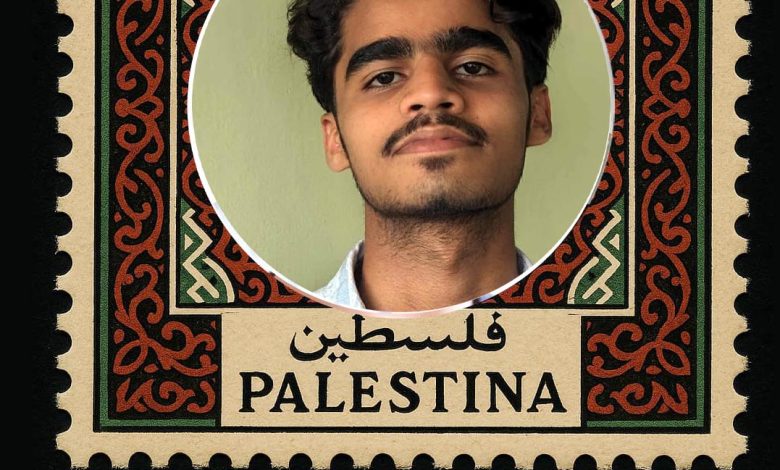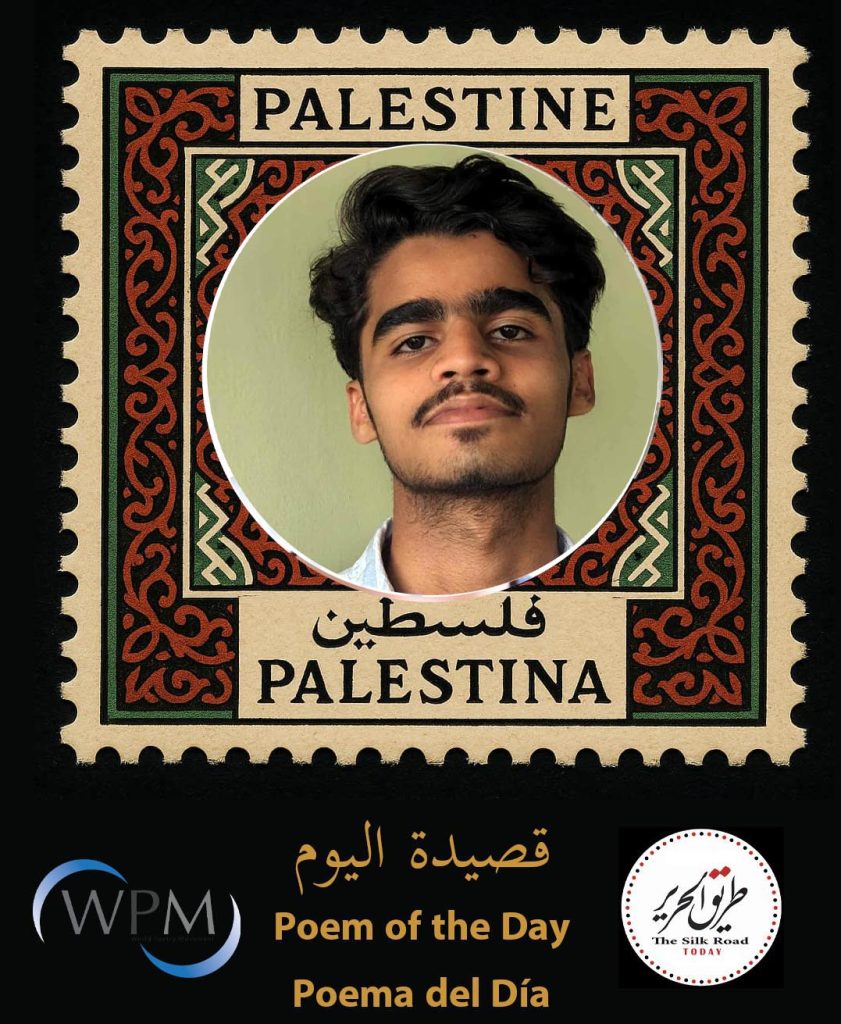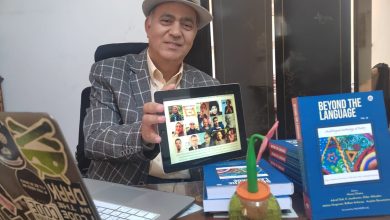
درويش | للشاعر ميلين نوفا، الهند
درويش،
كيف لا تزال
تلقي خطبًا مدوّية؟
سمعتُ؛
أنك قد فارقت الحياة.
التاريخ الذي كتبته
كثيرًا ما لامس عينيّ،
يسمّونه شعرًا.
هل يكتب المؤرخ قصائد؟
أم أن التاريخ نفسه قصيدة؟
لا أدري.
كل مرة أعيد قراءة
سطوره،
تتحول الحروف إلى جراح،
تجبرني على البكاء.
ومن حولي يحدقون،
يهمسون عن ذاك
الذي يبكي
بلا سبب.
أبياتك،
شظايا من التاريخ
تفوح منها رائحة البارود،
حطّمت
جدران الفصل العنصري التي شيدوها،
واصطدمت بقلوبهم
فانهارت إلى رماد.
كيف حوّلتَ الرثاء إلى هتاف؟
والدماء إلى شراب مقاومة؟
والخيام الممزقة إلى قصور سماوية؟
هل هي الحيلة ذاتها
التي جعلت الأيادي العارية بنادق؟
درويش،
أنا على يقين
بأنك لن تموت،
فأنت فلسطين،
وفلسطين خالدة.
ترجمها إلى العربية: أشرف أبو اليزيد
Darwish,
Darwish
¿cómo sigues
pronunciando discursos poderosos?
Escuché
que habías llegado a tu fin.
La historia que escribiste
a menudo ha tocado mis ojos.
Algunos la llaman poesía.
¿Acaso un historiador escribe versos,
o es la historia misma un poema?
No lo sé.
Cada vez que leo
sus líneas,
las letras se vuelven heridas,
obligándome a llorar.
Los que me rodean observan,
susurrando sobre alguien
que llora
sin razón.
Tus versos,
fragmentos de historia
que huelen a pólvora,
han destruido
los muros del apartheid que construyeron.
Se estrellan contra sus corazones
y se deshacen en cenizas.
¿Cómo transformaste los lamentos en consignas,
la sangre en bebida de resistencia,
las tiendas rasgadas en cámaras celestiales?
¿Fue el mismo truco
que convirtió manos desnudas en fusiles?
Darwish,
Creo firmemente
que no morirás.
Eres Palestina,
y Palestina es inmortal.
قصيدة “انتظار الهدنة” للشاعر ميلين نوفا، الهند
انتظار الهدنة
أمّ
تنتظر،
لتبحث عن أمومتها الضائعة
في الشارع.
أب
ينتظر،
ليبيع شيئًا من ثقل مسؤولياته
في السوق.
أخ
ينتظر،
ليتأمل بقع الدم الطازج
على الحجارة الحادة.
أخت
تنتظر،
لتُعلِّم ابنة أختها
قصيدةً عن أرضٍ مسالمة.
طفل
ينتظر،
ليحمل حقيبته المدرسية
على كتفه ويرقص.
عاشق
ينتظر،
ليجمع شظايا
قلبٍ مكسور.
صحفي
ينتظر،
ليبثّ التحديثات الحية
للا إنسانية.
طبيب
ينتظر،
ليدرس تشريح
محرقةٍ جديدة.
وأنا أيضًا؛
أنتظر،
لأقف على قدميّ
وأروي حكاية الدموع
بإبداعٍ أكبر،
وأعدّ جراح جسدي.
ثمّ تسقط صاروخ،
وتحترق الخيمة،
من أعلاها إلى أسفلها،
وأحترق أنا، مع الثمانية في داخلها:
أم، أب، أخ، أخت،
طفل، عاشق، صحفي، وطبيب،
(لا أحد منهم من أقربائي)،
كانوا جميعًا في انتظار الهدنة.
ترجمها إلى العربية: أشرف أبو اليزيد
Darwish by Melin Nova, India
Darwish,
how do you still
deliver powerful speeches?
I heard;
you had met your end.
The history you wrote
has often touched my eyes.
Some call it poetry.
Does a historian write verse,
or is history itself a poem?
I do not know.
Each time I go through
its lines,
letters turn to wounds,
forcing me to shed tears.
Those around me watch,
whispering about one
who weeps
without reason.
Your verses,
fragments of history
that smell of gunpowder,
have shattered
the apartheid walls they built.
They crash into their hearts
and crumble into ash.
How did you transform laments into slogans,
blood into a drink of resistance,
tattered tents into celestial chambers?
Was it the same trick
that turned bare hands into rifles?
Darwish,
I firmly believe
you won’t die.
You are Palestine,
and Palestine is immortal.
The Wait for a Ceasefire by Melin Nova
A mother
is waiting,
To search for a lost motherhood
on the street.
A father
is waiting,
To sell some of his heavy responsibilities
in the market.
A brother
is waiting,
To observe young bloodstains
on the sharpened stones.
A sister
is waiting,
To teach her niece
a poetry piece about a peaceful land.
A child
is waiting,
To carry a schoolbag
on his shoulder and dance.
A lover
is waiting,
To collect the remnants
of a broken heart.
A journalist
is waiting,
To telecast the live updates
of inhumanity.
A doctor
is waiting,
To study the anatomy
of a holocaust.
I am also;
waiting,
To stand on my feet
and narrate the story of tears
more creatively,
counting the number wounds on my body.
Then a missile lands,
And that tent burns,
from top to bottom,
Me with those eight inside it:
A mother, a father, a brother, a sister,
A child, a lover, a journalist, and a doctor,
(None of them are my relatives)
waiting for a ceasefire.
[Melin Nova is a passionate Indian writer who creates poems and essays in Malayalam and English, exploring human emotions and social issues. He also translates literary works between English, Urdu, Hindi, and Malayalam.
La espera de un alto el fuego
Una madre
espera,
para buscar la maternidad perdida
en la calle.
Un padre
espera,
para vender parte de sus pesadas responsabilidades
en el mercado.
Un hermano
espera,
para observar manchas de sangre fresca
en las piedras afiladas.
Una hermana
espera,
para enseñar a su sobrina
un poema sobre una tierra en paz.
Un niño
espera,
para llevar su mochila escolar
en el hombro y bailar.
Un amante
espera,
para recoger los restos
de un corazón roto.
Un periodista
espera,
para transmitir en vivo
la inhumanidad.
Un médico
espera,
para estudiar la anatomía
de un holocausto.
Yo también
espero,
para ponerme de pie
y narrar la historia de las lágrimas
con más creatividad,
contando el número de heridas en mi cuerpo.
Entonces cae un misil,
Y esa tienda arde,
de arriba abajo,
y yo ardo con los ocho que estaban dentro:
Una madre, un padre, un hermano, una hermana,
Un niño, un amante, un periodista y un médico,
(Ninguno de ellos es mi pariente),
esperaban el alto el fuego.





